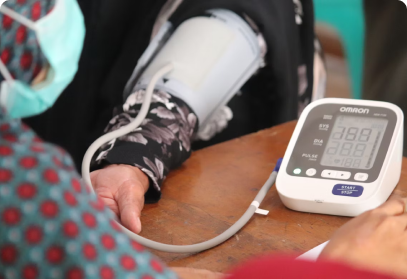Nutrition and Lifestyle Tips for a Healthy Menopause

Menopause is a natural phase in every woman’s life, marking the end of menstrual cycles. While it is a normal biological process, menopause brings a variety of physical and emotional changes that can affect daily life. At City Care Clinic, we help women navigate this transition with personalized care, expert guidance, and holistic strategies that include nutrition, lifestyle adjustments, and medical support to ensure a healthy, fulfilling experience.
Understanding Menopause:
Menopause typically occurs between the ages of 45 and 55 and is confirmed after 12 consecutive months without a menstrual period. The transition phase leading up to menopause is called perimenopause, which can last several years and involve fluctuating hormone levels.
Common symptoms include:
- Hot flashes and night sweats
- Mood swings, anxiety, or depression
- Sleep disturbances
- Vaginal dryness and urinary changes
- Fatigue and reduced energy
- Weight gain and changes in body composition
Understanding these changes is the first step toward managing them effectively and maintaining overall health.
Importance of Nutrition During Menopause:
Proper nutrition can alleviate symptoms, support bone health, and reduce the risk of chronic conditions such as heart disease, diabetes, and osteoporosis.
1. Calcium and Vitamin D
Calcium and vitamin D are essential for bone strength. Women are at increased risk of osteoporosis after menopause due to declining estrogen levels.
Sources:
- Dairy products: milk, yogurt, cheese
- Leafy greens: kale, spinach
- Fortified foods: cereals, plant-based milk
- Sunlight exposure for vitamin D synthesis
2. Protein
Adequate protein intake supports muscle mass, metabolism, and overall health.
Sources:
- Lean meats, poultry, and fish
- Legumes, lentils, and beans
- Eggs and dairy
- Nuts and seeds
3. Phytoestrogens
Phytoestrogens are plant compounds that mimic estrogen in the body, helping alleviate menopausal symptoms such as hot flashes.
Sources:
- Soy products: tofu, soy milk, edamame
- Flaxseeds and sesame seeds
- Whole grains and legumes
4. Omega-3 Fatty Acids
Omega-3s reduce inflammation, support heart health, and improve mood.
Sources:
- Fatty fish: salmon, mackerel, sardines
- Walnuts, chia seeds, and flaxseeds
5. Hydration and Fiber
Drinking plenty of water and consuming fiber-rich foods improves digestion, reduces bloating, and supports overall metabolic health.
Sources:
- Whole grains, fruits, and vegetables
- Legumes and seeds
Lifestyle Strategies for Managing Menopause:
Along with nutrition, lifestyle adjustments can significantly improve quality of life during menopause.
1. Regular Exercise
Exercise maintains bone density, supports cardiovascular health, improves mood, and aids in weight management. Recommended activities include:
- Aerobic exercise: walking, swimming, cycling
- Strength training: weightlifting or resistance bands
- Flexibility and balance: yoga or Pilates
2. Stress Management
Chronic stress can exacerbate menopausal symptoms. Mindfulness, meditation, deep breathing exercises, and hobbies help manage stress and improve emotional well-being.
3. Sleep Hygiene
Adequate sleep is vital during menopause. Tips include:
- Maintaining a consistent sleep schedule
- Avoiding caffeine and electronics before bedtime
- Creating a comfortable, dark, and cool sleeping environment
4. Avoiding Unhealthy Habits
- Reduce alcohol consumption, which can trigger hot flashes and affect sleep.
- Avoid smoking, which accelerates bone loss and increases cardiovascular risk.
Medical Support and Monitoring:
Menopause may require medical intervention for symptom management or prevention of complications:
- Hormone Replacement Therapy (HRT): Can reduce hot flashes, night sweats, and mood swings.
- Bone Density Testing: Monitors risk of osteoporosis.
- Heart Health Monitoring: Ensures cardiovascular well-being, as risk increases after menopause.
- Mental Health Support: Counseling and therapy can help manage anxiety, depression, or mood changes.
At City Care Clinic, our specialists offer comprehensive assessments and individualized treatment plans tailored to each patient’s needs.
How City Care Clinic Supports Women During Menopause?
City Care Clinic provides a holistic approach to managing menopause:
- Personalized Care: Individual assessments to identify symptoms and health risks.
- Nutritional Guidance: Diet plans tailored to alleviate symptoms and support bone and heart health.
- Lifestyle Counseling: Exercise routines, stress management strategies, and sleep hygiene guidance.
- Medical Interventions: HRT, supplements, and preventive screenings when needed.
- Ongoing Support: Follow-ups and educational resources to empower women throughout menopause.
Our goal is to ensure that every woman experiences menopause with comfort, confidence, and optimal health.
Conclusion:
Menopause is a natural life stage, but it doesn’t have to compromise health or quality of life. With proper nutrition, lifestyle adjustments, and medical support, women can manage symptoms effectively, maintain bone and heart health, and enjoy overall wellness. At City Care Clinic, we provide compassionate, comprehensive care to help women navigate menopause safely and confidently.
Take control of your health today. Schedule a consultation at City Care Clinic and let our experts guide you through a healthy, empowered menopause journey.







.png)
.png)
.png)
.png)

.png)